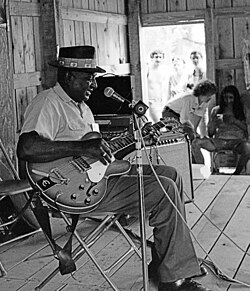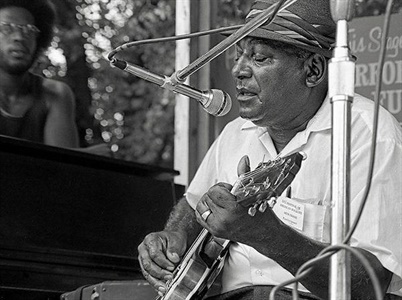Houston Stackhouse: The Unsung Backbone of Delta Blues
Houston Stackhouse may not be as widely known as some of his contemporaries, but his influence on the Delta blues and his role in nurturing future blues legends make him an essential figure in the genre’s history. Born into the heart of Mississippi blues country, Stackhouse’s life and music reflect the deep roots and communal spirit of the blues tradition.
Early Life and Musical Roots
Houston Stackhouse was born on September 28, 1910, in Wesson, Mississippi, a small town nestled in Copiah County. Raised in nearby McComb, he grew up surrounded by the music and hardships that defined the Mississippi Delta region. Like many bluesmen of his generation, he was largely self-taught, learning guitar by listening to records and watching others play.
His early musical influences included Tommy Johnson, whose distinctive falsetto and eerie, emotive guitar work left a lasting impression on the young Stackhouse. He also admired and emulated the style of Charlie Patton, often considered the “Father of the Delta Blues.” These early exposures shaped Stackhouse’s musical identity and linked him to the foundational figures of the genre.
A Career of Collaboration
Stackhouse began performing in the 1930s, moving around Mississippi and Arkansas, often playing with other musicians who would later become influential in their own right. Among his most important associations was with Robert Nighthawk (also known as Robert Lee McCollum), a friend and collaborator for many years. The two shared a deep musical bond, and Stackhouse often played rhythm guitar behind Nighthawk’s fluid slide guitar work.
Though Stackhouse was an accomplished guitarist and singer, he rarely recorded or sought the spotlight. Instead, he became known as a mentor and accompanist, helping to shape the sounds of other musicians. His work with Little Walter, Earl Hooker, and B.B. King stands as a testament to his musical versatility and quiet influence.
The Elusive Recording Career
Unlike many blues musicians who found fame later in life during the blues revival of the 1960s, Stackhouse remained mostly in the background. He made only a handful of recordings under his own name, often preferring to support others rather than take center stage. His performances were primarily live, in juke joints, clubs, and on regional radio stations such as KFFA in Helena, Arkansas, where he played on the famous King Biscuit Time show.
One of the rare moments Stackhouse was recorded was in the 1960s by field researchers and blues enthusiasts who were attempting to document the living tradition of Delta blues. These recordings, raw and deeply authentic, capture Stackhouse’s talent and the timelessness of his music.
Legacy and Influence
Houston Stackhouse passed away on September 23, 1980, just five days shy of his 70th birthday. Though he never achieved the fame of his peers, his impact on the blues world is undeniable. He represents the community-oriented nature of blues music, where skill was passed from one musician to another in informal settings, and where many gifted artists remained unsung heroes.
His role as a teacher, sideman, and tradition bearer cements his place in blues history. Modern blues enthusiasts and scholars now recognize Stackhouse as a crucial link between early Delta pioneers and the more polished electric blues that would dominate the mid-20th century.
Conclusion
Houston Stackhouse may not be a household name, but his story is essential for anyone seeking to understand the full picture of American blues. He stands as a symbol of the countless musicians who lived and breathed the blues without commercial recognition, sustaining the tradition and passing it on to the next generation. In honoring Stackhouse, we honor the roots, resilience, and soul of the Delta blues.


Comments are closed